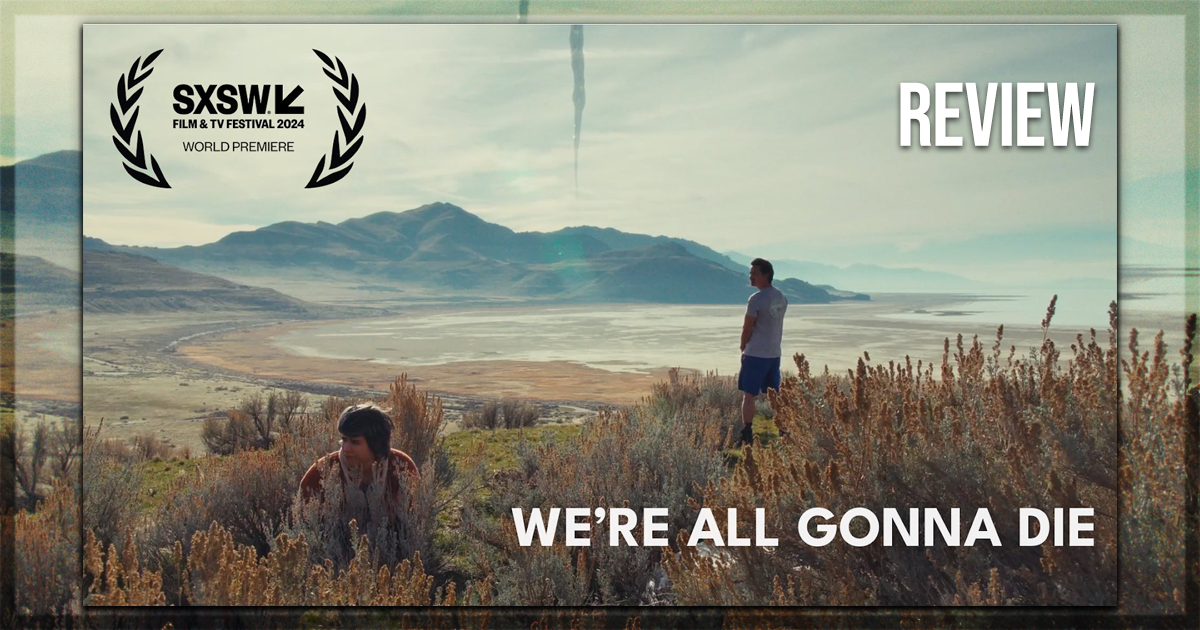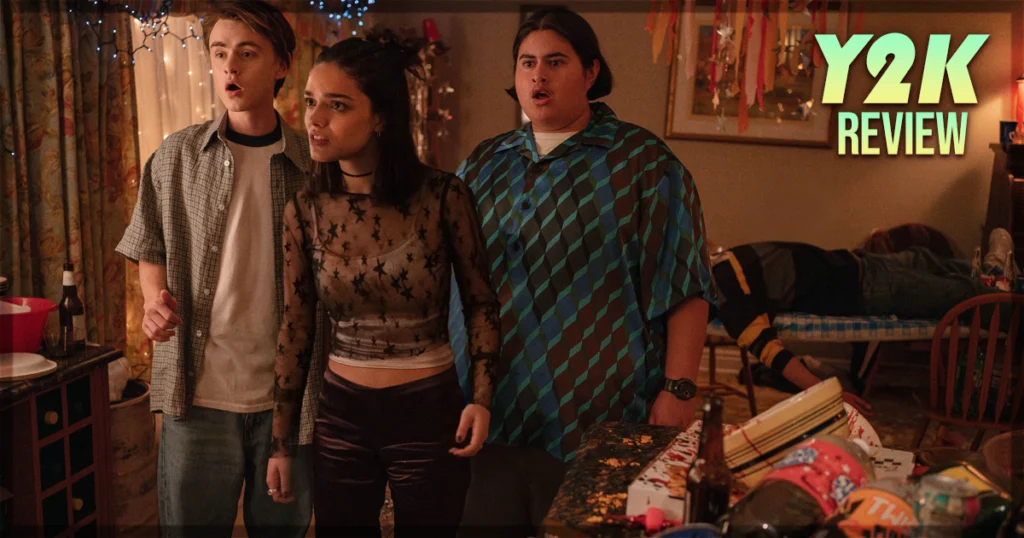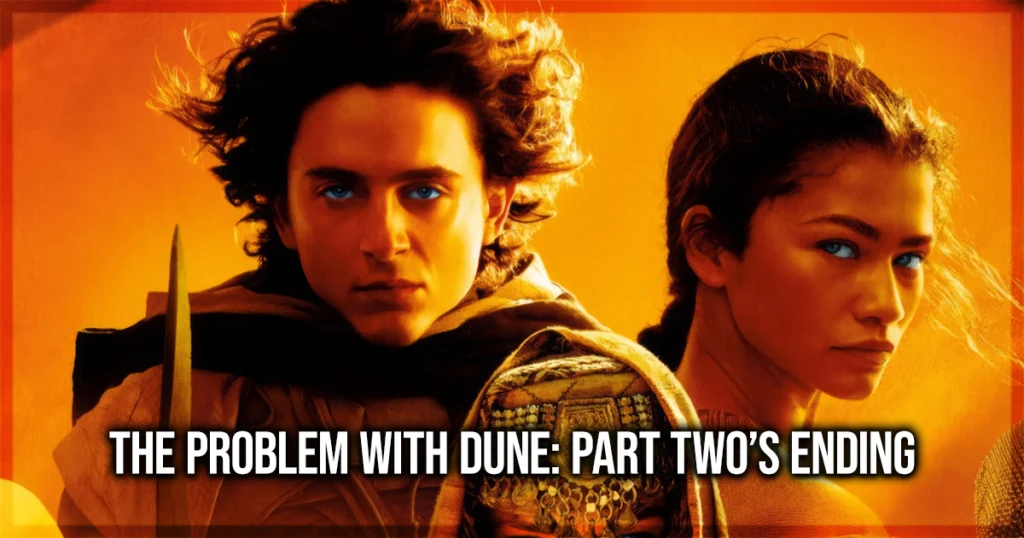Everyone expects that the end of the world – or at least of civilization as we know it – will come about in a big, transformative way. An extinction event or an apocalyptic end to all we know and love has been predicted by many science fiction stories and zombie movies. But, in all likelihood, an erosion of society may happen instead, a slow chipping away of what used to be normal. In the words of Kai (Jordan Rodrigues), one of two characters drawn together by events out of their control in We’re All Gonna Die, who would have thought that the end of the world would be so boring?
The story of We’re All Gonna Die
This film begins with the arrival of an unexplained alien presence known as the spike, a ten-thousand-mile tentacle that begins jumping unpredictably from place to place, reaping death and disaster everywhere it goes. It’s often present and visible in the distance, but those who haven’t been killed by one of its jumps go about their lives as usual. Twelve years and more than fourteen hundred jumps after the spike’s first sighting, Thalia (Ashly Burch) is a beekeeper hitting the road to drive her beloved bees to her latest assignment. When she nearly falls asleep during the drive, she comes very close to hitting Kai, who is not in a good place following the death of his best friend.
The two connect but soon find their conversation interrupted by an apparent spike jump that has swapped part of the road they’re on with a river somewhere nineteen hours away in Washington, taking Kai’s car and Thalia’s bees with it. Kai is more than up for a road trip, while Thalia just wants to find her bees and get back to work. What ensues is an eye-opening journey that shows how these two people have continued to stick around in a world that doesn’t always look as different as it should from present-day reality.
This future-set film only offers small teases about its universe
The little hints of this film’s universe are immeasurably interesting, infrequent as they may be. A sign can be read outside a glass lake formed by a jump that has been dedicated as a national park by the “Western United States” in 2029. States like Washington, Nevada, and Arizona still exist, but there are also places known as New Zion and the New Idaho Territories. While phones still work and cars still drive, one of the biggest referenced changes is that people can’t eat sushi anymore, though neither Thalia nor Kai knows exactly why that is.
This film employs a very effective low-grade approach to its science-fiction premise. The spike is far in the background in most scenes, almost invisible as part of the horizon. But when it gets close, it’s something else entirely, which this film never quite explains but offers a captivating and terrifying brief look at as its characters approach their intended destination. It’s clearly capable of true devastation, though no one knows why it does what it does and whether there’s a rhythm or purpose to its seemingly unpredictable and destructive movements.
The little details in We’re All Gonna Die make all the difference like when Thalia and Kai encounter two teenagers on bicycles who describe their intention to bike to Vermont, a goal they can’t comprehend is physically impossible by that mode of transportation. It’s not clear if they’re not talking seriously or if they just don’t know how far away it is because distances don’t seem the same for those who have grown up only ever knowing the spike as a reality. Thalia stops at a roadside diner and only wants to order the pancakes if they’re not from a mix, a luxury that seems greatly out of sync with what’s widely available in this film’s world.
All creative forces align for a memorable character exploration
We’re All Gonna Die is a winning feature directorial debut for Matthew Arnold and Freddie Wong, who bring a subtle but vividly interesting creative vision to life. Their script is rich and funny and equally capable of navigating seamlessly between humorous and contemplative dramatic moments. Their actors are also perfectly cast. Burch plays Thalia as witty but easily annoyed and Kai as well-meaning but regularly distracted by his desire to strike up a good conversation. It’s great fun watching them bicker and even more rewarding to see them start to actually get along and mean something to each other.
We’re All Gonna Die may not be typical science fiction and certainly not your average post-apocalyptic film, but that’s because it takes established concepts and tropes and ponders what it would be like if things didn’t actually get as bad as everyone always thinks they will. The result is a surprisingly engaging and thought-provoking journey with two people who don’t know what they’re searching for, heading towards a destination they believe will bring them some sense of peace or closure. As tends to be the case with good road trip movies, it’s more about what happens on the trip than actually getting to its intended finish. Arnold and Wong show marvelous potential with this film, a superb specimen that’s unlikely to be replicated again in its sheer originality and authenticity.
We’re All Going To Die recently played at SXSW. It’s currently in limited theaters nationwide.
Are you interested in We’re All Going to Die? You can find out more information about local screenings at the movie’s website. Let us know if you’re checking it out connecting with us on X @MoviesWeTexted.



